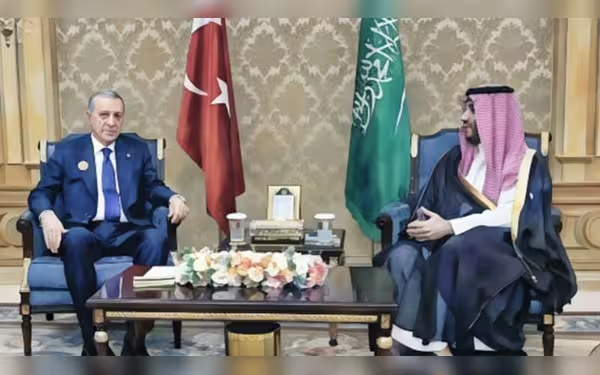Sunday, January 12, 2025 11:59 AM
Gaza Crisis: Muslim Nations' Inaction Amidst Palestinian Suffering
- Over 45,000 Palestinians killed since October 7, 2023.
- Muslim leaders fail to take decisive action in Riyadh summit.
- Resolutions deemed 'toothless tigers' lacking real solutions.
 Image Credits: thefridaytimes
Image Credits: thefridaytimesThe ongoing Gaza crisis highlights the inaction of Muslim nations amidst severe Palestinian suffering.
The ongoing conflict in Gaza has reached alarming levels since October 7, 2023, with reports indicating that over 45,000 Palestinians have lost their lives due to a relentless Israeli offensive. The situation in the Gaza Strip is dire, characterized by widespread destruction and suffering. Despite the gravity of this humanitarian crisis, the collective response from the 55 Muslim countries, often referred to as the "Muslim Ummah," has been disappointingly muted. These nations have largely remained silent spectators, issuing only statements of condemnation without taking any substantial action to alleviate the plight of the Palestinian people.
In a recent summit held in Riyadh, leaders of Muslim nations gathered to discuss the ongoing crisis in Gaza. However, despite impassioned speeches and promises of support, they failed to devise a concrete plan to address the Israeli aggression. The resolutions passed during this summit echoed previous statements, reiterating condemnation of Israel's actions while lacking any actionable steps to halt the violence or support the establishment of an independent Palestinian state.
Many Muslim-majority countries, including Egypt, Jordan, the UAE, Qatar, and Kuwait, maintain diplomatic and trade relations with Israel, even as the latter continues its military operations in Gaza. The blockade imposed by Israel has left approximately two million Palestinians facing starvation and a severe lack of medical supplies. Alarmingly, no Muslim nation has severed diplomatic ties with Israel in response to these atrocities. While South Africa has taken the initiative to challenge Israel in the International Court of Justice, the Muslim world has remained largely passive.
The resolutions from the recent summit, much like those from previous gatherings, have proven to be "toothless tigers." They offer little more than verbal condemnation and fail to provide any real solutions. The statement expressing support for Egypt and Qatar's efforts to achieve a ceasefire is particularly troubling, given that the United States has historically backed Israel in its military endeavors. The U.S. has consistently vetoed UN resolutions calling for a ceasefire, and its military presence in the region has facilitated Israel's actions against Palestinians.
As the Muslim Ummah looks towards the incoming Trump administration in the United States, there is a sense of misplaced hope. Trump's history of unwavering support for Israel raises doubts about any potential for meaningful change. His administration previously shifted the U.S. Embassy to Jerusalem, effectively endorsing Israel's occupation of Palestinian territories. Furthermore, Trump's encouragement of Israel to "get the job done" in Gaza reflects a troubling alignment with Israeli interests rather than a commitment to peace.
The inaction of the Muslim world in the face of such overwhelming suffering in Gaza is a profound disappointment. The lack of unity and decisive action among Muslim nations not only undermines the Palestinian cause but also emboldens Israel to continue its aggressive policies. It is imperative for the Muslim Ummah to move beyond mere rhetoric and take tangible steps to support the Palestinian people. Only through collective action and genuine solidarity can the cycle of violence be broken, and a path towards peace and justice be forged for the people of Palestine.













